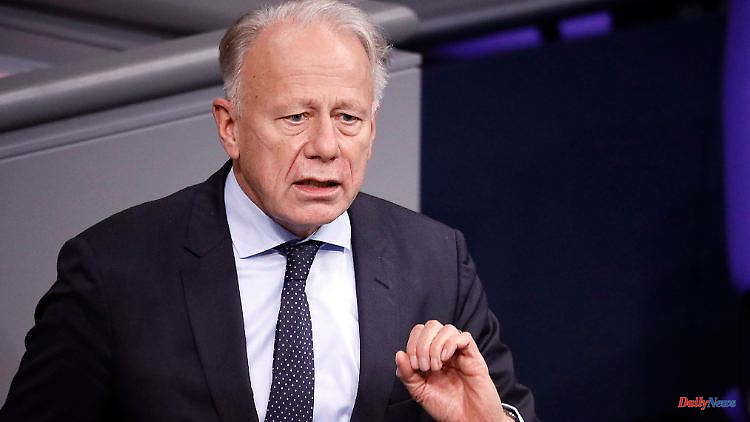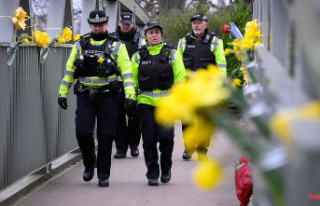At the Munich Security Conference last weekend, the West sent a unified signal of support for Ukraine in the war against Russia. But China also appeared very self-confident and announced a peace plan for the conflict. Green foreign politician Jürgen Trittin calls this an "important and correct step". On the other hand, he is critical of the reaction of the USA. And Trittin speaks - after a trip by the Foreign Affairs Committee to Japan and South Korea - about the situation in East Asia, the Taiwan question and the German East Asia strategy.
ntv.de: The war in Ukraine was a big topic at the Munich Security Conference at the weekend. But China was also very present. How did you experience that?
Jürgen Trittin: In the clear, if not harsh, speech by the top foreign politician, Wang Yi, it was clear that China is very self-confident in its stance. He conveyed two messages: On the one hand, referring to Taiwan, he emphasized his country's one-China policy and territorial integrity. From my point of view, however, that was also an announcement to Russia, given the violation of Ukraine's territorial integrity. On the other hand, there was the announcement of a proposal to end the war. In this respect, China took the opportunity in Munich to come up with a proposal that goes a step beyond the pure self-assurance that shaped this conference so much.
How likely is it that the peace plan announced by China will be taken seriously in the West?
If I understood the Chancellor correctly during his visit to China, he called on the country to become more involved in this conflict. In this respect, China's announced peace plan is an important and correct step, which Annalena Baerbock rightly welcomed. But China must also be aware that Ukraine decides its own fate and that a dictated peace is not an option. I hope, however, that this initiative will not now be overshadowed by the US warning that China is planning to supply arms to Russia.
Is there any actual basis for the warning?
I can not say that. However, if there was none, it is nevertheless suitable for disavowing the Chinese proposal for a possible solution to the Ukraine conflict. That would not be a wise move. In any case, so far China has done everything possible to avoid possible sanctions for supporting Russia. I don't see any solid reason why they should risk it now. Because China also knows that supplying arms to Russia would be completely unacceptable.
What signal is China sending with its peace plan to the world - especially to those countries that have so far been rather neutral in this conflict?
It is quite clear that the European EU and NATO countries are taking sides in this conflict because they cannot accept Ukraine being overrun and to put a stop to any further attacks by Vladimir Putin. However, it is also clear that the Europeans are only of limited use as mediators in ending this conflict. In the end, the only real political speech that was given in Munich was that of Emmanuel Macron. He rightly pointed out that even after this war, Russia will still be a neighbor in Europe.
Who can play a role in ending the war?
We have repeatedly called on the BRICS countries or other allies of Russia to get involved in resolving the conflict. These states - that is, Brazil, India, South Africa and China - might be more likely to persuade Russia to cease hostilities. China's peace plan can therefore be a step in the right direction. This is also in Europe's interest.
You and other Foreign Affairs Committee members last week visited Japan and South Korea, both of which have imposed sanctions on Russia. How exactly is the course of the war observed?
There are definitely differences. Japan has an ongoing dispute with Russia over the Kuril Islands...
... the group of islands that the Soviet Union occupied after the end of the Second World War.
Japan continues to regard these islands as its sovereign territory. With the war in Ukraine, however, the question of restitution has become a long way off. In addition, Japan fears an extreme impediment to its export capabilities in view of a possible escalation of the Taiwan question. More than 80 percent of Japanese exports pass through the Taiwan Strait. So the concern in Japan is very great and taking sides is clear.
And in South Korea?
Here, the issue of dealing with North Korea is much more important than the Taiwan issue. South Korea sees that neither Russia nor China has an interest in dropping the ruling Kim family for strategic reasons. Of course, China does not want US troops to be standing directly on the border.
How likely does Japan consider a Chinese attack on Taiwan in the coming years?
The impression - which I also share - is that after the Russian intervention in Ukraine, China is completely recalculating the use of force against Taiwan. It is conceivable that China would first like to wait and see whether the Kuomintang, which is pursuing a policy of flexible adjustment to China, will win the presidential elections in Taiwan next year.
How is Japan dealing with the risk of escalation?
On the one hand, Japan has increased its armament efforts. In the future, two percent of the gross national product is to be spent on armaments, currently it is one percent. On the other hand, Japan has formed a strategic alliance with the United States and Taiwan to jointly produce the latest generation of chips. In addition, a joint factory with the largest Taiwanese manufacturer of older-generation chips, i.e. for refrigerators or cars, is being set up. So the country is already preventing the consequences of a possible escalation in Taiwan. We should take this as an example in Europe.
Is there already progress in reducing German dependence on China?
Both Japan and South Korea welcome the fact that Germany is taking a realistic look at China with the planned new China strategy. On the other hand, both countries do a lot of trade with China themselves and know that such ties cannot - and should not - be completely reversed. It's more about retaining or relocating certain strategic industries while diversifying production chains. In the draft of the China strategy, Germany is going in this direction. It names the strategy for a problem for which we don't really have a solution yet.
Are there concrete expectations of Germany in the event of an escalation over Taiwan?
There is no expectation of a NATO defense commitment to Korea and Japan. However, both the symbolic presence of the frigate "Bayern" in East Asia and the joint Eurofighter exercises with Australia were warmly welcomed. In essence, however, both countries are relying on increased economic and political cooperation. That is why, for example, the EU's trade agreement with Japan is of central importance, just like the trade agreements with the ASEAN countries and with Australia, which are currently being negotiated. This strengthening of economic and political cooperation also corresponds to the realignment of East Asia policy under Foreign Minister Baerbock and Chancellor Scholz. So far, this has only been concentrated on China.
Markus Lippold spoke to Jürgen Trittin












